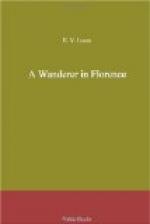Of the old man in the company of fair listeners we have glimpses in the reminiscences of Mrs. Fields in the “Atlantic Monthly” in 1866. She also describes him as in a cloud of pictures. There with his Pomeranian Giallo within fondling distance, the poet, seated in his arm-chair, fired comments upon everything. Giallo’s opinion was asked on all subjects, and Landor said of him that an approving wag of his tail was worth all the praise of all the “Quarterlies “. It was Giallo who led to the profound couplet—
He is foolish who supposes
Dogs are ill that have hot
noses.
Mrs. Fields tells how, after some classical or fashionable music had been played, Landor would come closer to the piano and ask for an old English ballad, and when “Auld Robin Gray,” his favourite of all, was sung, the tears would stream down his face. “Ah, you don’t know what thoughts you are recalling to the troublesome old man.”
But we have Browning’s word that he did not spend much time in remorse or regret, while there was the composition of the pretty little tender epigrams of this last period to amuse him and Italian politics to enchain his sympathy. His impulsive generosity led him to give his old and trusted watch to the funds for Garibaldi’s Sicilian expedition; but Browning persuaded him to take it again. For Garibaldi’s wounded prisoners he wrote an Italian dialogue between Savonarola and the Prior of S. Marco. The death of Mrs. Browning in 1861 sent Browning back to England, and Landor after that was less cheerful and rarely left the house. His chief solace was the novels of Anthony Trollope and G.P.R. James. In his last year he received a visit from a young English poet and enthusiast for poetry, one Algernon Charles Swinburne, who arrived in time to have a little glowing talk with the old lion and thus obtain inspiration for some fine memorial stanzas. On September 17th, 1864, Death found Landor ready—as nine years earlier he had promised it should—
To my ninth decade I have totter’d on,
And no soft arm bends now my steps to
steady;
She who once led me where she would, is gone,
So when he calls me, Death shall find
me ready.
Landor was buried, as we saw, in the English cemetery within the city, whither his son Arnold was borne less than seven years later. Here is his own epitaph, one of the most perfect things in form and substance in the English language:—
I strove with none, for none was worth my strife,
Nature I loved, and next to Nature, Art;
I warmed both hands before the fire of life,
It sinks, and I am ready to depart.
It should be cut on his tombstone.
CHAPTER XXV
The Carmine and San Miniato
The human form divine and waxen—Galileo—Bianca Capella—A faithful Grand Duke—S. Spirito—The Carmine—Masaccio’s place in art—Leonardo’s summary—The S. Peter frescoes—The Pitti side—Romola—A little country walk—The ancient wall—The Piazzale Michelangelo—An evening prospect—S. Miniato—Antonio Rossellino’s masterpiece—The story of S. Gualberto—A city of the dead—The reluctant departure.




